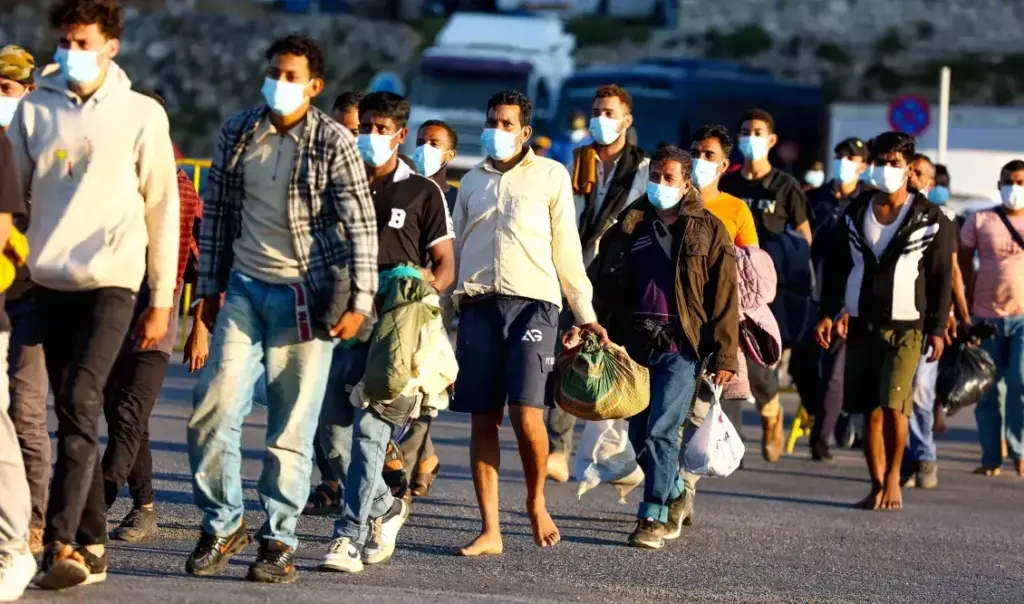With positive reception, the new bill titled “Reform of framework and procedures for returns of third-country nationals” was submitted to Parliament on Friday, aiming to strengthen the institutional framework for combating illegal immigration. This move follows the successful implementation of the recent asylum suspension amendment, which substantially contributed to drastically reducing flows from Libya.
Read: Greece and Hungary sign migration cooperation memorandum – 1,722 unaccompanied minors
Anti-illegal immigration measures – Everything the bill includes
According to reporting by Dimitris Andriopoulos in “Apogeumatini” newspaper, the redesign of the migration framework is in full development, with Migration and Asylum Minister Thanos Plevris stating that Greece will not become a gateway for illegal immigrants, adopting increasingly strict measures. The new bill updates Greek legislation in accordance with Directive 2008/115/EC, establishing clear rules and procedures for returning third-country nationals residing illegally in the country. Additionally, it adopts the guidelines of the new European returns regulation, contributing to the country’s alignment with European policies and regulations in this area.
New rules established by the bill
The government aims with the new bill primarily to prohibit the entry of illegal immigrants into the country, establishing six basic decisions:
- The framework is tightened according to European regulation guidelines, making it a mandatory reason for entry prohibition when third-country nationals pose a risk to public order, national security, and public health.
- The duration of entry prohibition is extended from 5 to 10 years, with the possibility of additional extension up to 5 more years.
- Illegal stay in the country after completion of administrative procedures is criminalized.
- Imprisonment of at least three years and a monetary fine of €10,000 are established, without possibility of conversion or suspension of the sentence.
- There is the possibility of sentence execution suspension, provided the convicted person declares voluntary departure from Greece, with suspension taking effect from the moment of departure.
- Illegal immigrants remaining in the country will face only two options: either imprisonment or return to their country of origin.
Rules for detention and penalties
The bill also addresses the issue of detention with the following basic provisions:
- Reasons for detention are extended to security matters, with explicit prohibition of detention suspension in case of objection submissions. Detention duration increases from 18 to 24 months, with possibility of extensions, while prerequisites for detention are reviewed every six months.
- Monetary penalties for those illegally re-entering the country are significantly increased, from €3,000–10,000 to €10,000–30,000.
- Prison sentence limits for illegal entry into the country are increased: from 3 months to at least 2 years, and in aggravating circumstances from 6 months to at least 3 years.
- Monetary penalties increase from €1,500 to €5,000 and in aggravating circumstances from €3,000 to €10,000.
- The possibility of submitting subsequent applications for international protection is limited.
- The granting of residence permits to those remaining illegally in the country for more than 7 years is abolished.
Voluntary departure and definition updates
Special emphasis is placed on voluntary departure, with significant changes in the bill: deadlines for voluntary departure are reduced from 25 to 14 days, while extension for exceptional reasons is reduced from 120 to 60 days. Additionally, electronic surveillance is provided as a restrictive measure during this deadline.
Simultaneously, definitions are updated and expanded, such as the concept of return country, adding as return countries: a) the country of habitual residence, b) a safe third country where the international protection application was rejected as inadmissible, and c) the first country of asylum with corresponding rejection.
Finally, definitions of flight risk are tightened, adding as objective criteria: a) the absence of residence or known accommodation, b) sudden and unannounced change of residence or accommodation, and c) refusal of identification through biometric or other means.
Vindication of migration policy
Competent government officials characterize the substantial elimination of flows from Libya as vindication of the government’s migration policy. They emphasize that the first week of July recorded the largest peak of illegal entry to Crete, with 2,711 arrivals, of which 900 in just one day. The asylum suspension amendment was submitted on July 9 and began taking effect immediately. Since then, within almost a month, illegal arrivals from Libya amounted to only 913 people — a number smaller than arrivals in just one day before the amendment’s implementation. Significantly, during this period there were several days with favorable weather conditions for travel, while the majority of flows were recorded in the first days, before Greece’s strict stance became known.




